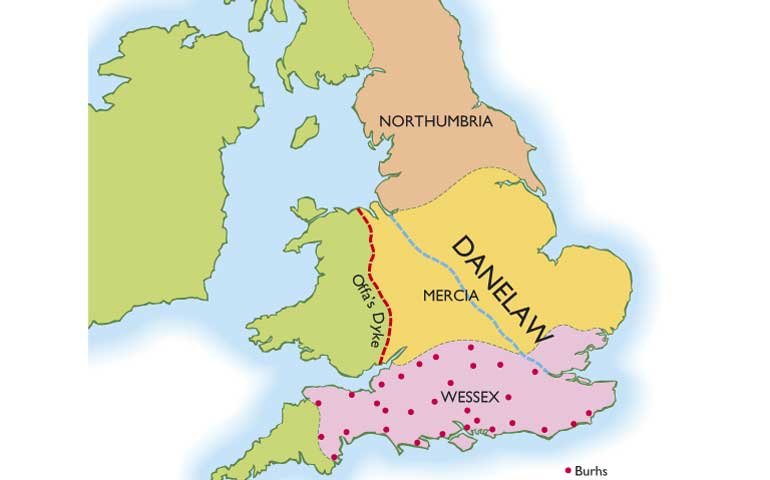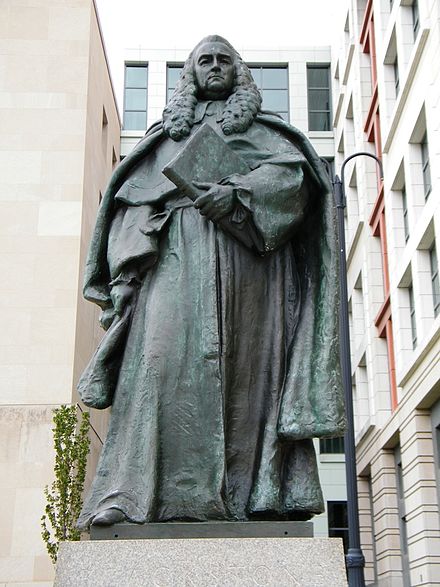A Language of an oft Conquered Isle
Author: P. Henge.
Most languages of the world have well defined structures stemming from a single origin, albeit with a few foreign notes – not unlike a good vintage wine. Yet English, to be sure, is non-vintage, but just as stressed grapes create the best wines, so the tortured story of English has created a rich blend of the languages of conquerors. The remarkable thing is that the native English speaker does not notice that he is effortlessly combining three or four languages in each sentence uttered.
When the Romans left Britain around 410 A.D., the Anglo-Saxons, who had long been raiding the shores, decided on making the British Isles their permanent home. They displaced the Romanised Celts that had been living under Roman rule for the four centuries since the last of the iron-age Celtic tribes had been subdued. The Arthurian legends perhaps hint at resistance to the Anglo-Saxon incursion, but the resistance was ultimately futile. Some refugees managed to flee to Roman controlled areas on the continent, creating the Brittany of today. As for remnants of the language of pre-Roman Britain, only about 20 words of the Celtic language remain in Modern English – words like crag and cairn. Virtually no Latin survives from the long occupation. Loan words from Latin came much later.
For the next four centuries, various Germanic tribes (Angles, Saxons, and Jutes) vied for supremacy, establishing their domain in different parts of the island. King Offa built his famous dyke to keep out the Welsh – the word Welsh simply meaning foreigners in the Anglo-Saxon tongue. The great Roman buildings and complexes were allowed to decay. It is at this time the term Angle-land (England) was coined to describe the land of the Angle people. Anglo-Saxon England had begun gradually to be Christianised. Monks, such as the venerable Bede (d. 735 A.D.), kept chronicles of Anglo-Saxon life and pagan sagas were written down in Old English.
Then, as if from nowhere, in 793 A.D. a band of pagan Viking (Norse) raiders attacked a monastery called Lindisfarne on the coast of England, killing all the unarmed monks, and carrying away the sacred gold and silver artefacts. This was the first of many deadly raids, culminating in the arrival of the Great Heathen Army in 865 A.D. One after the other, the great Anglo-Saxon Kingdoms tumbled, their kings brutally tortured to death. Within a few years, only Wessex in the southwest of England remained under Anglo-Saxon rule. The Vikings had come in great numbers to settle, dominating the entire northeast of England and imposing their language.
Both the Viking and the Anglo-Saxon languages were similar, derived from a common Germanic root. They also shared similar gods – the Norse god Odin is cognate with the Anglo-Saxon god Woden. Most English days of the week are still named after these Germanic gods, including Woden’s day or Wednesday. There was certainly a great deal of mutual intelligibility, and this is where the first mixing and “simplification” of English began. Some words in English today from old Norse include skull, sky, skill, skin, berserk, window (wind eye), knife, knot, and ombudsman. Often, English has inherited both the Anglo-Saxon and the Norse word for something, but with each word taking on a nuanced change in meaning.
For a while it looked like the Norsemen would completely dominate England. It was King Alfred of Wessex (who became The Great in the 16th century) who was determined not to allow Wessex to fall to the Vikings. In 878 a great battle against the Viking Guthrum was fought at Edington by Alfred. Alfred won the day, Guthrum was spared, then converted to Christianity, and all Viking lands (Danelaw) were brought under Anglo-Saxon rule. Yet Alfred is known for more than this great victory, he was a patron of learning, proposing that Old-English rather than Latin should be used for education. He also improved the defence and governance of England allowing a time of peace and flourishing.
Had the Vikings won, there would be no English or England today, only a variant of the Scandinavian language and many more red-headed people than exist in the British Isles today. It would also have been unlikely that history would have followed the route to 1066 A.D., which then brought with it and entirely different language to the British Isles – Norman French.
The Normans were peculiar as they too were descended from Vikings. Some 150 years before 1066 A.D., a Viking leader named Rollo had been given the land north of Paris under the express condition that he stop the Viking raids on Paris. The word Norman is, of course, derived from North-man, as is the territory they occupied – Normandy. Initially, these Normans spoke Old Norse but within 150 years had completely adopted the Vulgar Latin language of the region, introducing in turn, a few Old Norse words.
Without going into the squabble that led to the Normans invading England, in 1066 William of Normandy defeated the Anglo-Saxon army of King Harold at Hastings near the English south coast. The Anglo-Saxon nobility of England were put to the sword and, for the next two hundred years, Norman French was the language of courtly power in England. Yet while the Normans held the power, they were a minority. Various Anglo-Saxon/Viking dialects were spoken all over England by the more numerous common folk. The class divide expressed itself in the language used. In the field one spoke of cows, and sheep, and deer but in the noble houses one ate beef, and mutton, and venison.
Over those two centuries Old English morphed, retaining its structure and its more basic words from Anglo-Saxon/Viking, but adding an overlay of Norman French – with a most peculiar pronunciation (compared to modern French). Note that Norman French was its own dialect bringing into English many words which do not exist in modern French. As an example, “mortgage” or “bond until death” is unknown in France today.
By the 13th Century, English Kings had adopted the hybrid tongue as the courtly language. By the 14th century poetry was being written in that language, yet still with a heavy Germanic flavour. Indeed, many spellings of words still retain pronunciations from that time, such as eight, freight, night, bight, and light. German speakers will recognise that the “ght” is the same as the guttural “cht” in Acht, Fracht, Nacht, Bucht, and Licht. English, or at least British/Australian English, retains ancient spellings as a time capsule of linguistic evolution. Some plurals also retain Germanic forms, such as mice and lice.
Then in the 15th century, the great vowel change occurred, and the “modern” English of Shakespeare came into being. Shakespeare himself had a great influence on the language, inventing many words and phrases we still use today. Then, as the enlightenment intensified through the 17th century, English adopted many words from Latin and Greek to describe the new concepts being developed. While other languages often look to within their own vocabulary to create new words, the English convention is to use either classical Latin or Greek. In some cases, the convention is strictly followed as in the Greek derived “telescope” – “far-seeing.” Unfortunately, when a device was invented to receive moving pictures at a distance the name “telescope” had already been taken, so the Latin “vision” was affixed to “tele” to create the Chimera “television” – far-seeing. Had the traditional convention been followed, flat screen “proculvisions” would adorn our walls today.
The story of English is, of course, much more complex than this short introduction. However, it is clearly a mongrel of a language with words, plurals and both modifying prefixes and suffixes from Germanic and Romance roots. Each language has added its own vocabulary with words flowing into every conceptual nook and cranny. The blending has also meant it has lost much of the complexity of other languages, losing gender, as well as many pronouns, tenses, and declensions. The phrase “I thou thee” was once a sign of great disrespect as it uses the familiar form of the pronoun “you” used for children and servants. Literally translated it would be “I you you.” What a shame that pronoun-based insult is now lost.



